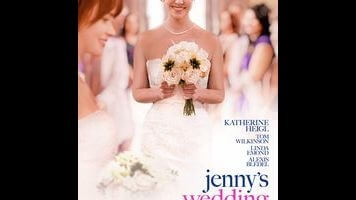Jenny’s Wedding would’ve been the hippest gay-themed indie of 1995

If the gay-marriage melodrama Jenny’s Wedding had come out (so to speak) 20 years ago, it might provoke a queasy, quasi-nostalgic fascination today. Hey, remember the ’90s, when just about every gay-themed indie that escaped the festival circuit was a “telling the family” story? And remember when any star-driven movie that dealt with homosexuality was tentative and giggly? Writer-director-producer Mary Agnes Donoghue’s new film is a curious hybrid of those two trends, which both duly died out as times changed. It’s not that there’s universal tolerance of homosexual relationships in the United States today, and it’s not that some families aren’t still evolving at different rates on the issue of same-sex marriage. But Jenny’s Wedding proceeds as though there hasn’t been decades of popular culture—wildly popular popular culture—about the LGBT community’s intersections with the straight world. This is a movie displaced in time. And it’s barely a movie. It’s more like a dusty, faded old pamphlet: “So your daughter’s decided to get gay-married…”
Jenny’s Wedding is at least watchable though, for a couple of reasons. First, the cast is made up of reliable pros, able to give Donoghue’s stilted dialogue actual nuance. Katherine Heigl plays Jenny, a middle-aged lesbian who finally opens up about her partner Kitty (Alexis Bledel) when she gets tired of her family trying to set her up with marriageable men. Grace Gummer is Jenny’s competitive sister Anne, who clings to her husband and kids as proof that she’s “better,” but after the big announcement comes to realize that domesticity alone hasn’t made her happy. And Tom Wilkinson and Linda Emond are Jenny’s upper-middle-class, conservative parents, who have trouble accepting who she is, mainly because they’re worried what the neighbors will think. As basic as this plot and these characters are, the actors bring enough conviction to the material to make its series of big third-act reconciliations genuinely moving.
The other main reason to see Jenny’s Wedding is that it’s just so… odd. Donoghue is a veteran screenwriter, who penned Beaches and the 2002 adaptation of White Oleander (among other films). Yet the script here is rudimentary, full of characters filling the audience in on their jobs or the time of the year by saying things like, “Look, I’m a fireman, so I know men,” or, “Well, it’s almost turkey day, your favorite holiday.” At one point early in the film, Jenny’s family becomes convinced she’s having an affair with a married man, and from then on people ask what’s happening with “the married man,” always using those exact three words, as though that were the guy’s name. Later, Anne realizes her marriage is over when she stares at a patch of dead grass on her lawn, and for the rest of the film she repeats this epiphany—“Happy people don’t have dead grass!”—to everyone she meets.
The movie as a whole takes Anne’s approach, shouting pat and/or obvious revelations as though they were important discoveries. It’d be one thing if Donoghue were interested in the small details of how a closeted gay woman comes out in 2015, or if the casting of Heigl were some sly subversion of romantic-comedy convention. But Jenny’s Wedding is stupefyingly straightforward, and isn’t trying to be funny. This is the kind of drama where “the neighbors” actually judge Jenny’s family for raising a lesbian, and are caught gossiping in the grocery store, saying, “They must’ve done something wrong.” The story is reportedly based on something Donoghue experienced in her own family, but there’s nothing personal or quirky here—nothing that would get in the way of this film working as a feature-length PSA.